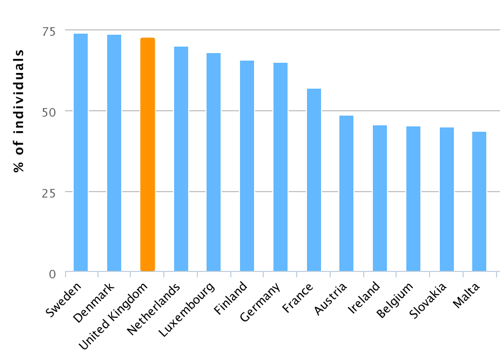Are small companies lagging behind in ecommerce?
Are small companies lagging behind in ecommerce?
The UK has embraced ecommerce more enthusiastically than every other EU country bar Sweden and Denmark.
Buying stuff online is incredibly popular, with more than 73% of people buying at least something online in 2012. The EU average was just below 50%, so where online shopping is concerned the UK really does blaze a trail.
Check out this graph from the EU's Digital Agenda. Each bar represents the percentage of individuals who bought online in 2012. The highlighted bar shows where the UK sits in the EU's top nations:

As you'd expect, this has resulted in a seriously big internet shopping market. E-retail expert IMRG reckons it's worth around £78bn.
Yet when you dig deeper into how that market is made up, it looks like smaller companies aren't claiming their fair share of the territory.
Enterprises surge ahead
According to EU figures for 2012, just 17% of UK small and medium-sized enterprises (SMEs) sell their goods or services online. Take in isolation, that sounds pretty low. But when you realise 42% of enterprises sell online, you can see the gap is actually pretty large.
As if to underline this discrepancy, the same research suggests that while online sales account for 25% of total enterprise turnover, for SMEs the figure is a paltry 8%.
Ecommerce is getting easier
|
It's not difficult to draw a conclusion here. It seems larger companies have managed to incorporate online selling into their business models more effectively than smaller competitors.
Setting up an online shop used to be really tricky. You had to build the whole thing from scratch, creating your online catalogue, shopping basket system and payment services from nothing.
That required real expertise - and the kind of money only bigger companies have.
But things are very different a few years on. You don't need much technical knowledge at all to sell online.
Reclaiming lost ground?
You can use an off-the-shelf ecommerce system to provide the framework for your shop. All you have to do is to populate it with your products and work out how to deliver them.
So, as it's so easy to start selling online, can we expect a surge in smaller companies doing so? Perhaps they're about to reclaim some of that lost ground.
Or, more depressingly, is the best model for online commerce to pile 'em high and sell 'em cheap? If so, smaller companies must find their niche to sell online effectively. Because it's almost impossible to take on giants like Amazon and beat them at their own game.
How does selling online work for your business?




Comments
Add a comment